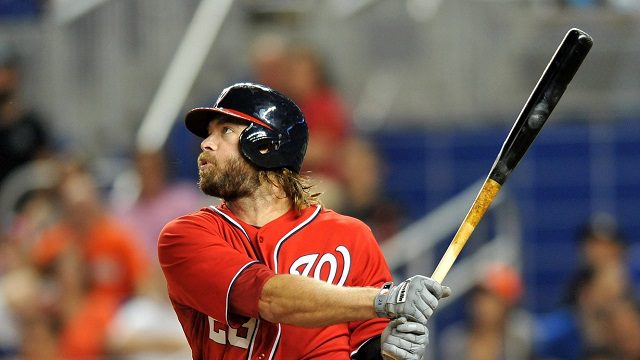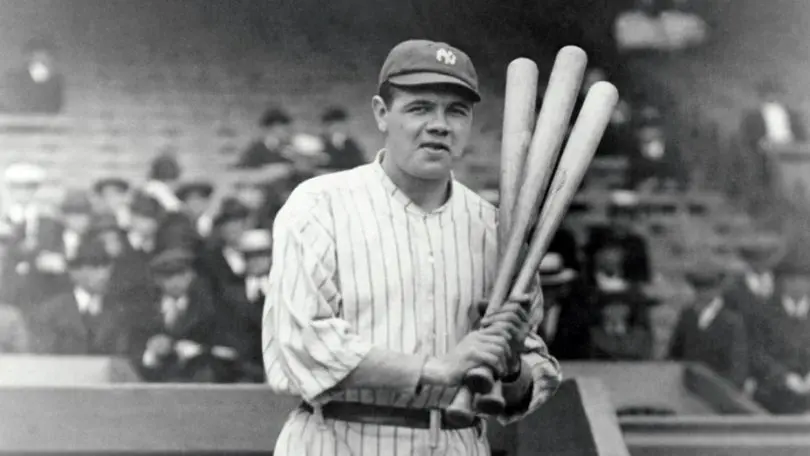

In a season where they won 86 games, finished second in their division and made a late push for the playoffs, the Washington Nationals were considered underachievers. But Jayson Werth, their highest paid player, put together a terrific season while starting to shed the “bust” label that described his first two and a half seasons with Washington.
How Jayson Werth came to be not only the most expensive National, but also the 14th most expensive player in baseball history, is well understood. It was autumn, 2010, and Jayson Werth was coming off a career year. He had just led the National League in doubles with 46, scored 106 runs, batted .296/.388/.532 and produced around five wins above replacement. He also finished eighth in the NL MVP voting for his contributions as the top position player on a 97-win Philadelphia Phillies squad.
Still, the Scott Boras client did not seem likely to command a nine-figure contract on the open market. He was a late-blooming outfielder on the wrong side of 30 who had never batted .300 or driven in 100 runs in any of his eight seasons. While a very good complementary player, he was not somebody upon whom to build a franchise.
That’s what made it so surprising when the Nationals gave Jayson Werth a seven-year deal for $126 million, way more than he deserved and way more than anyone else was willing to give him. It was a curious move by Washington at the time given that they had just lost 93 games and were still a few years away from contending. To be fair, they did have a huge void to fill in the middle of their order following the departure of Adam Dunn, who signed his own free agent deal with the Chicago White Sox.
Jayson Werth could never dream of matching Dunn’s power numbers, but he was a vastly superior all-around player who contributed additional value with his defense and baserunning.
The Nationals improved to 80-81 in 2011, but Jayson Werth was a massive disappointment. His OPS plunged more than 200 points, he struck out a career-high 160 times and knocked in only 58 runs. Put it all together and he was barely above replacement level. Washington’s fans and media, many of whom weren’t excited about Werth’s arrival in the first place, soured on him.
In 2012 Werth’s performance rebounded, but he missed three months with a broken wrist and didn’t hit for much power. He played 81 games that year, his fewest since 2003. FanGraphs and BR both agree that Werth was worth just 0.7 WAR. That didn’t stop the Nats from winning 98 games, most in baseball. Young superstars Bryce Harper and Stephen Strasburg excited baseball fans everywhere with their flamboyant style of play, so nobody cared too much that Jayson Werth’s numbers projected to 10 home runs and 62 RBI over the course of a full season.
2013 appeared to bring more of the same disappointing results. Werth got off to a slow start and was hitting just .260/.308/.400 through May 2nd before a strained hamstring forced him back to the Disabled List. He missed a month, but the time off seemed to do him some good. He returned to action on June 4th, and from that day forward he was one of the best hitters in the National League. The 34 year-old batted .334/.421/.569 with 21 homers and 72 RBI the rest of the way, prompting Davey Johnson to move him down from the two hole to maximize his RBI opportunities. For the first time in his Nationals career, Werth proved himself capable of shouldering the offensive burden that a middle-of-the-order hitter is expected to carry.
Werth, who got stronger as the season wore on, was particularly lethal over a two month stretch from June 30th-August 29th in which he batted a scalding .393/.484/.669. When Washington roared back into contention in September, they were able to do so largely because Werth’s heavy hitting had kept them afloat all summer. Though the Nats ultimately fell short of the postseason, Werth established personal bests in batting average (.318), OPS (.931), OPS+ (154) and bWAR (4.8). He led the team in most major offensive categories and was the team’s most valuable position player per bWAR (FanGraphs gives the slight edge to Ian Desmond).
While Werth’s big season has done much to salvage his reputation, he still has four years and $83 million remaining on his backloaded contract. As he gets deeper into his thirties, Werth will have a hard time staying healthy and productive enough to justify that salary. But let the record show that in 2013, at least, he was worth every penny.





